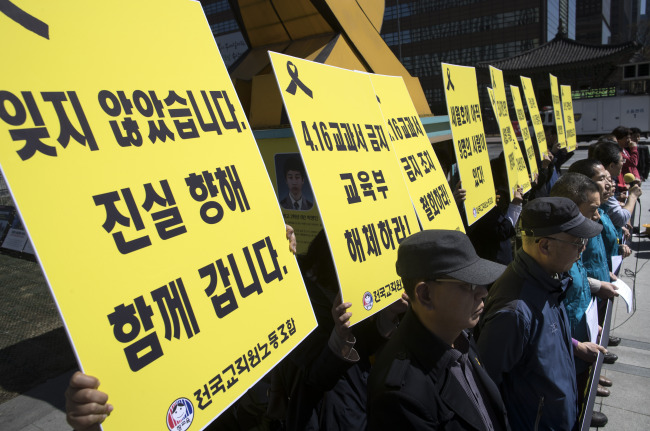The Korean government on Tuesday stepped up its warning against a liberal teachers’ group for using a controversial textbook which it accuses of biasedly illustrating the Sewol ferry tragedy.
The warning came after the Korean Teachers and Educational Workers’ Union vowed to push ahead with the use of the “416 textbook” that it published last month to mark the second anniversary of the tragedy that took the lives of 304 passengers who were mostly high school students on April 16, 2014.
It was the ministry’s second warning since it notified municipal education offices of the ban against the use of the textbooks on March 25.
 |
| Members of the liberal teachers’ group hold a rally opposing the Education Ministry’s recommendation to ban the use of the ‘Sewol textbook’ in Seoul on Monday. (Yonhap) |
“If any cases occur in which prejudiced education violates the educational neutrality at school, (the ministry) will immediately probe the case and take stern measures,” said Education Ministry official Kim Dong-won, who is in charge of school policy.
The group has advocated the textbooks as necessary to teach students about the tragedy and to remember the victims. The group’s members plan to use the textbooks for two weeks under the “special education” program.
Special education refers to classes in which each school can discretionally teach on certain issues, acknowledging the necessity of students’ right to learn about major incidents such as the Korean War.
Two years after the Sewol tragedy, controversy persists over the lackluster rescue efforts, failed systematic control of ships and the government’s alleged involvement. The special investigation committee is scheduled to wrap up its probe in May this year.
There are two types of the textbook published, one for elementary school and one for middle school, and it comprises four chapters that illustrate the systematic causes of the tragedy, the KTU said.
The Education Ministry, however, has ordered municipal education offices to make sure they do not use the textbooks in schools.
The government has concluded that the textbook may hinder the development of the correct national view among students as it allegedly contains unconfirmed and distorted allegations and arguments as well as expressions that are not educational.
For example, President Park Geun-hye was implied as being a monster in one of the books which quoted a storybook that compiles stories from 65 authors who wrote about the Sewol tragedy in 2014.
After describing how a dragon hauled off children and that the queen, who did not save them, only shed tears after they were gone, the book quotes the story, saying that the unmasking of the queen revealed the monster inside. The next page is a picture of Park, tearing up while delivering a national address of the tragedy.
The textbook also suggested ungrounded doubts over the government’s probe into the tragedy, the ministry said.
Facing public controversy over the textbook, the liberal teachers’ group said it would correct the misinformation in question. The ministry, however, said the KTU changed only four out of 17 problematic content.
Despite the ministry’s warning, several cities and provinces including Seoul, Jejudo, Gyeonggi and North Jeolla decided to leave the decision up to teachers.
“Special education is strictly up to the schools’ rights and teachers have the right to select their class material. Since the controversy over biases was sparked, however, (the Seoul Metropolitan Office of Education) asked schools to go through the appropriate procedure for using the textbook to make sure that students do not get exposed to biased perceptions,” Seoul education authorities said.
The special education program requires approval from the school’s curriculum committee and the principal.
By Lee Hyun-jeong (rene@heraldcorp.com)

